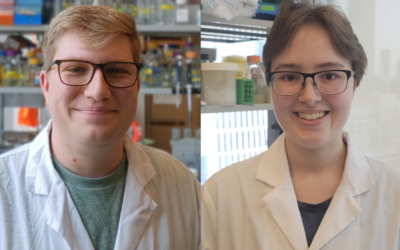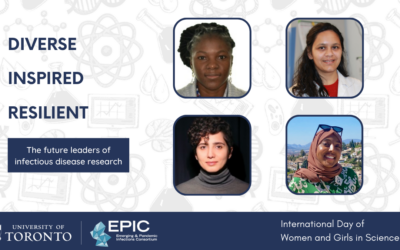News & Events
Events
News
EPIC congratulates recipients of the 2025 Inspire Summer Studentships
Top row (left to right): Elect Adenuga, Atinuke Boboe, Abdulkadir Duble. Second row (left to right): Kaden Hill, Makuach Joack, Jezreel Sol-Edeigba May 12, 2025 By Sunitha Chari The University of Toronto’s Emerging and Pandemic Infections Consortium (EPIC) has...
Targeting pleural immune cells to treat bacterial infections and improve lung transplant outcomes
Sumiha Karunagaran (left) is investigating how immune cells in the pleural cavity (right- shown in pink) respond to bacterial infections of the lungs April 17, 2025 By Sunitha Chari Lung transplant recipients are on lifelong immunosuppressant drugs to reduce their...
A new bivalent vaccine offers hope for preventing antibiotic-resistant Neisseria gonorrhoeae infections
(left to right) Jamie Fegan and Epshita Islam with Trevor Moraes By Sunitha Chari Researchers at the University of Toronto have developed a new vaccine formulation for the sexually transmitted infection (STI) gonorrhea. The formulation comprises two antigens derived...
EPIC recognizes the outstanding scientific contributions of four young researchers through the 2025 Future Leaders Prizes
(left to right) Patrick Budylowski, Ashley Campbell, Julien Couture-Senecal, James Zhu March 14, 2025 By Sunitha Chari Today the University of Toronto’s Emerging & Pandemic Infections Consortium (EPIC) announced the winners of the 2025 Future Leaders Prizes. The...
Newly identified bacterial defence systems open avenues for treating drug resistant infections
Landon Getz (left) and Sam Fairburn February 25, 2025 By Sunitha Chari University of Toronto researchers have discovered nine new genes used by bacteria to protect themselves against viral infections. Their findings uncover a new hotspot in the bacterial genome for...
Highlighting diverse perspectives this International Day of Women and Girls in Science
February 11, 2025 By Sunitha Chari To mark the International Day of Women and Girls in Science, the University of Toronto’s Emerging and Pandemic Infections Consortium (EPIC) is sharing the stories and aspirations of four young and upcoming researchers from the EPIC...
EPIC launches Highly Pathogenic Avian Influenza Rapid Research Response to inform and support comprehensive influenza pandemic preparedness
(Left to right): Michael Norris, Samira Mubareka, Sharon Walmsley, Vanessa Allen and Beate Sander January 30, 2025 By Sunitha Chari The University of Toronto’s Emerging & Pandemic Infections Consortium (EPIC) has launched a Rapid Research Response to address the...
A tiny, gut-dwelling fungus might hold clues to fighting mosquito-borne diseases like Zika and malaria
U of T Scarborough researchers have decoded the genome of a gut-dwelling fungi that might unlock clues to fighting deadly mosquito-borne diseases (photos by Don Campbell) January 23, 2025 By Don Campbell U of T Scarborough researchers have successfully sequenced the...
U of T study uncovers how a new gut microbe drives the gut-lung axis
University of Toronto professor Arthur Mortha (right) and former postdoctoral fellow Kyle Burrows December 19, 2024 By Betty Zou A team led by University of Toronto researchers has discovered a new communication pathway between the gut and lung. Their findings...










